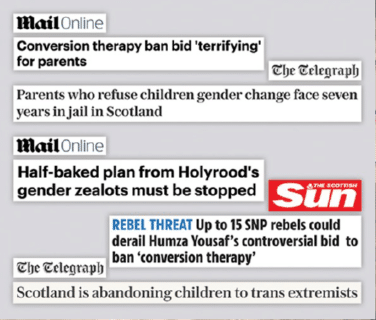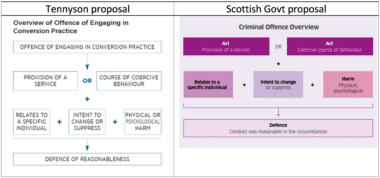
News Release
Alliance MLA conversion therapy proposal near-identical to plans abandoned by Holyrood
• Alliance MLA Eoin Tennyson has launched a private consultation into proposals on conversion therapy.
• But the proposals appear to be copied from plans abandoned by the Scottish Government, after being pilloried by the press and by lawyers.
• The Assembly member says he is proposing a Private Member’s Bill on the subject, which would criminalise anyone who engages in a ‘conversion practice’.
• Earlier this year, the Scottish Government gave up on legislating on the issue, saying there was a risk of legal challenge, and asked the Westminster Government to legislate instead.
Media reports explained how the Scottish proposals would criminalise parents and church leaders for refusing to go along with radical ideology on transgenderism and sexuality.
The Alliance Party has published a diagram showing how the Bill would work, which is almost identical to one in the Scottish proposals (see below).
It is not clear whether Mr Tennyson has any real prospect of bringing his Bill. The Department for Communities has led work on the subject previously, and Mr Tennyson has chosen to consult privately through the Alliance Party website rather than in cooperation with the Assembly.
Comment
The Christian Institute’s NI Policy Officer, James Kennedy, said:
“Thankfully, abusive practices are already outlawed in Northern Ireland. Christians oppose verbal and physical abuse. And yet we would be at risk from the Alliance proposals if we seek to offer pastoral care and prayer that accords with the Bible’s teaching.
“Whenever proposals are put forward on ‘conversion therapy’, whether in Northern Ireland or further afield, they inevitably cover innocent activity like parenting and the ordinary work of churches, including prayer and pastoral care.
“Near-identical proposals were offered by the Scottish Government, and it was not only Christians who feared they were at risk of being unjustly prosecuted. LGB groups, teachers, lawyers and concerned parents all raised serious objections. Almost every newspaper pointed out that a law like this would criminalise innocent people who merely refused to go along with LGBTQI+ ideology.
“Mr Tennyson has copied the threshold from the Scottish plans. The broad definition of ‘harm’ would mean a parent could be prosecuted when they discourage their child from gender transition or sexual experimentation. Even saying “you might regret it” could be seen as causing fear and thus be illegal.
“It is no surprise the Scottish Government were swift to abandon the plans out of fear they would face judicial review. With parents facing seven-year jail sentences, and pastors unable to pray with church members or encourage repentance , of course the Scottish Government was at risk of losing a legal battle on a new law.
“There will be an uphill battle for anyone claiming there is a need for this law. Research has repeatedly failed to show any gaps in the law. The Department for Communities even paid the Rainbow Project to provide it with case studies, but the academics drafted in to help quickly ran out of interview subjects. Not one case they reported suggested there is a need to change the law.
“Northern Ireland’s politicians must learn from the Scottish experience. The plans proposed by Mr Tennyson were abandoned by what many consider one of the most ‘progressive’ legislatures the UK has ever seen. Does anyone really think they are fit for purpose here?”
Reaction to the Scottish proposals
When the Scottish Government launched its proposals, The Telegraph led with the headline: “Parents who refuse children gender change face seven years in jail in Scotland”.
The Law Society of Scotland, which represents 13,000 solicitors in Scotland, warned that the definition of conversion therapy could include “praying with anyone about their sexual ethics or sexual behaviour, or offering counselling on such issues”. It said significant changes needed to be made.
Aidan O’Neill KC, wrote an independent legal opinion for The Christian Institute. He explained that the proposals were “beyond the powers of the Scottish Parliament to legislate”. He described them as “fundamentally illiberal” and said that the proposals contravened the European Convention on Human Rights on no fewer than four grounds.
The Catholic Church in Scotland said the plans could create “a chilling effect and may criminalize advice or opinion given in good faith”. The Free Church of Scotland said: “Sweeping new provisions have been drafted that could criminalise conversations and other interactions that are lawful and legitimate in a free society”.
Headlines following the Scottish plans:
ENDS
Notes for Editors:


